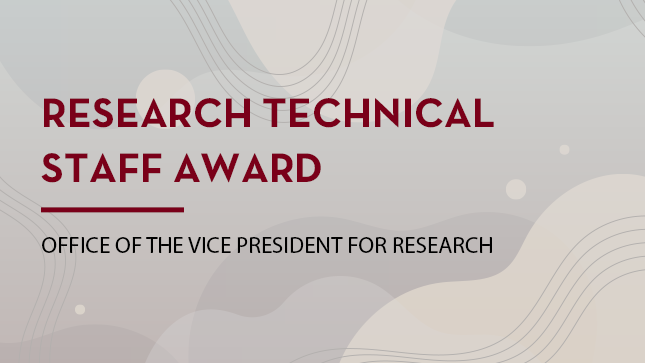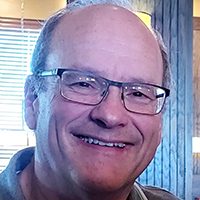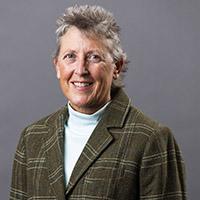
The Office of the Vice President for Research (OVPR) is proud to announce the winners of the Research Technical Staff Award, which recognizes staff for their distinguished service to the University of Minnesota research community and celebrates exemplary leadership that positively impacted their colleagues and advanced the University's mission. Each winner received a personal honorarium of $1000.
“This is an important and essential opportunity for us to recognize technical research staff for their many contributions in the sustainability and advancement of research enterprise, which, despite their importance, often go largely unnoticed beyond the research teams they support,” said Vice President for Research Shashank Priya. “Research staff function similar to a backbone, providing guidance, support, and strength for a research program. Through their countless unspoken contributions, they continue to improve the safety and quality of our institutional outcomes.”
Read on to learn about the winners, their roles at the University, and quotes from the colleagues that nominated them.

Eric Buchanan directs the renewable energy program at the West Central Research and Outreach Center (WROC), where he develops new project ideas, leads grant-funded projects, and provides oversight to junior scientists. He has led and participated in several high-profile, complex, multi-disciplinary research projects. Over the past two years, he has been a key part of a team that has produced over 57 refereed journal articles and was awarded over $17 million in research funding.
“Eric recognizes that the success of all the WCROC research programs only strengthens the impact and visibility that the WCROC has within the agricultural and renewable energy industry. Without his ideas and collaboration, the research programs would not be as strong and effective as they are today. Additionally, Eric is forward thinking and always searching for ideas that will increase the research at the WCROC. He has worked collaboratively with numerous Minnesota companies to provide leadership in the renewable energy industry.”

Alicia Hofelich Mohr is the research services coordinator at the Liberal Arts Technologies and Innovation Services, where she develops and maintains services and procedures to support research and creative work in the College of Liberal Arts. This includes providing consultation and direct support for all phases of the research data lifecycle and providing University-wide data management support through collaboration with the University Libraries Research Data Services.
“In sum, Alicia Hofelich Mohr is one of a kind. She embodies both the technical knowledge and skills to navigate all University systems with which researchers must interact and the social aptitude and patience to engage with a broad range of stakeholders to actually effect change and improve our processes. Alicia is tireless in her efforts to promote the research mission of the University, and the University is much better off for her efforts.”

Conrad Lindquist functions as a research engineer and lab manager who has held overlapping positions in the Departments of Orthopedic Surgery and Rehabilitation Medicine, the Orthopedic and Musculoskeletal Biomechanics labs, and currently in the Division of Physical Therapy, all within the Medical School, where he has worked since 1985. He provides technical innovation and support for a dozen research labs, ensuring PIs have the equipment they need.
“When an apparatus or piece of equipment does not exist to meet the researchers’ needs, Conrad builds it. For example, a researcher needed an apparatus that would hold a subject’s arm fixed at a precise angle for physiological testing to ensure consistent research results
between subjects. The researcher wanted to test subjects that same week. That day, Conrad purchased the necessary supplies to build the apparatus on an urgent basis. By 8am the next day, the apparatus was fully functional and set up in the researcher’s lab space. Conrad has fabricated many items over his 37 years of employment; too many to count. We often call him “MacGyver”. This goes well beyond the scope of his job.”
Conrad Lindquist plans to retire within the next year once he has finished managing a large project and will be missed!

Julie Mutchler is the analytical labs supervisor at the Natural Resources Research Institute’s Coleraine facility, where she leads a team serving the analytical needs for multiple principal investigators and clients across a variety of projects totalling more than $5 million annually. She serves as the onsite technical expert for analytical equipment and solves complex technical issues when they arise. She also trains and teaches research technicians and prepares training materials on operation of lab equipment.
“Julie’s exceptional work ethic can be summed up in a comment from an equipment repair technician. The technician told me he had never met anyone, in all his travels, as knowledgeable about their equipment as Julie. Aside from her ability to learn everything about her equipment, Julie’s knowledge of our analytical methods is exceptional. Her understanding and ability to explain complex chemical analysis techniques and processes has been invaluable to our research team and our clients.”

Maria Razzoli serves as research project specialist for the Bartolomucci Lab and behavior and metabolism specialist for the Physiology Core in the Department of Integrative Biology and Physiology. In these roles, she coordinates the activity of all in vivo experiments and the work of the 7+ members of the Bartolomucci Lab as well as of the Physiology Core users (20+ labs/year from across campus) for metabolic and behavioral services. Razzoli has authored 34 publications in peer-reviewed journals since 2011, significantly contributed to training at least 40 young scientists on nuances of in vivo physiology approaches, and is regularly consulted by a broad range of researchers to help design experiments.
“Thanks to Maria’s competence and expertise, my lab is continuously able to innovate and to contribute to the collective research endeavor of UMN Medical School with new experimental physiology approaches, as well as by training the next generation of scientists. Very often Maria leads the development of new tools and approaches, the hardest and riskier step in research, up to the publication of a first landmark study. Success in this critical first step enables us to compete for new grants and represents a springboard for research of students or post docs.”